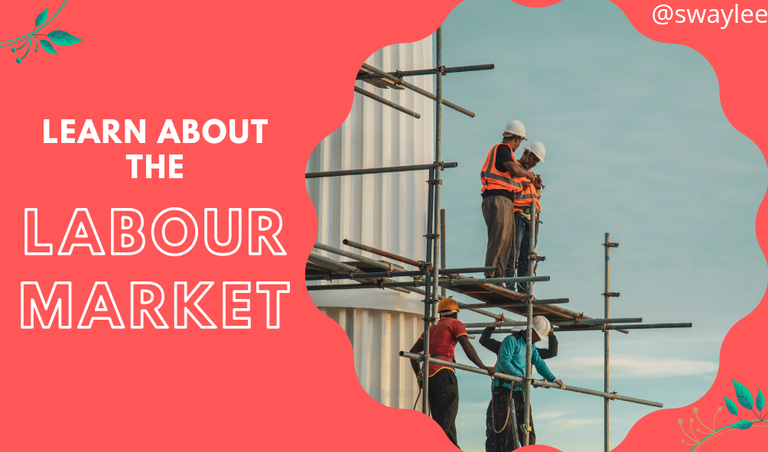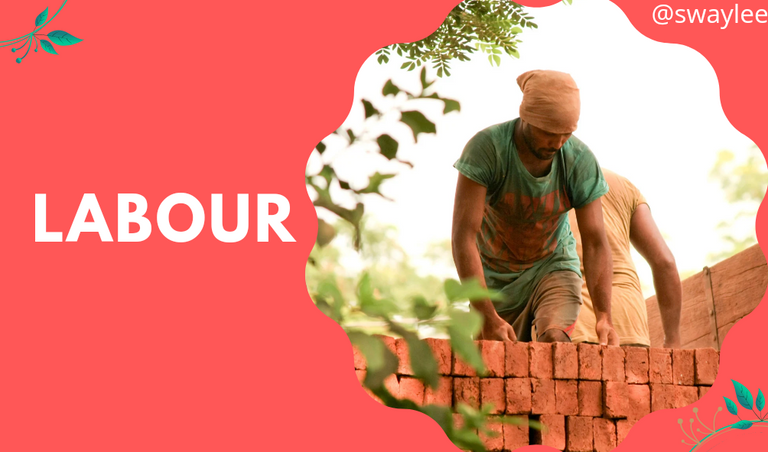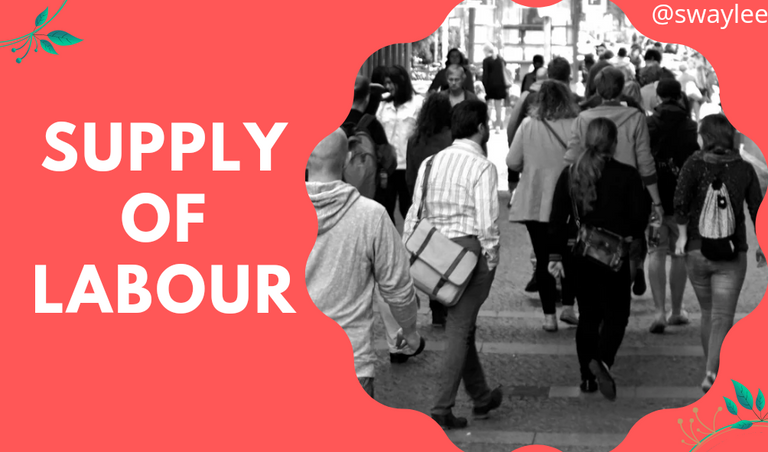

Greetings Everyone,
Rasheed is here again welcoming everyone to his blog. As an Economist, I trust we can already guess what the post would be looking at today. Today I will be talking about the labour market and the demand and supply of labour. It is sure to be an interesting lecture and I'm sure we would all learn something from it so keep reading for more details.

What is Labour

Labour from a layman point of view can be seen as a physical activity or work. You hear a woman in labour or someone carrying out hard Labour but when looking at it from an economist's point of view, labour is said to be a human resource and factor of production which can be bought and sold in the market in exchange for a reward called Wages and salaries. This implies that as far as you are selling your services for anything that involves getting paid wages and/or salaries ten you are carrying out Labour. Labour can be bought or sold in the labour market.
What is a Labour Market
The labour market can simply be put as an area or place where labour can be bought and/or sold. This shows us that human resources can be bought and sold. Among all the 4 factors of production, two of them fall under human resources (Entrepreneurship and labour). It is in the labour market that we can determine the demand and supply of labour in a particular economy.
Demand For Labour
This is the total amount of labour which employers are willing and able to hire and at a given wage rate. A wage rate for those who might not know is the rate at which labour is paid for the services it renders in the production process.
Supply Of Labour
This is the total number of people who are among the working class who are willing and able to get employment. If you are above 18 (in most cases) and you are willing to work for someone or looking for a job then you are of the working class and can be classified under the supply of labour.
Factors affecting the demand for labour

Demand for goods and services
The demand for goods and services can have a positive or negative impact on the demand for labour. If goods and services are in high demand then employers would seek more labour to be able to produce more to match the demand hence the there would be high demand for labour and vice versa.
Nature of Industries
The kinds of industries that need the labour really affect the demand for labour as some industries make use of large scale technology hence the dependence on human efforts is minimal meaning these kinds of industries would demand for far less labour than a labour intensive industry.
Availability of other factors of production
In the production process, there are four factors necessary for production to take place and they are presence of land, labour, capital and an entrepreneur. Now with more land, more labour can be employed, with more capital, more labour can be demanded and with a well versed and multitasking entrepreneur to co-ordinate and supervise there would be a general rise in general demand for labour.
Price of labour in the market
The price at which one can use to hire labour is another deciding factor. If labour in the labour market is relatively cheap, more employers would be able to demand for more labour but if labour is very expensive, the employer would have to select few and work with them to avoid running at a loss from the payment of wages and salaries.
Number of industries
In an economy where there are a large number of Industries and companies, there would generally be a large demand for labour to help in the production of goods and services but in a situation where there are a relatively small amount of Industries then there won't be need to hire a large amount of labour because they wouldn't be fully utilized.
Factors affecting the Supply Of Labour

The Official school leaving age
The age where people are considered to be the age where people are regarded as adults for example in most countries the official school leaving age is 18 years and above. So if by any chance the government reduces the school leaving age to 15 years then the supply of labour would definitely increase as more people would be considered adults and if the age is increased, the reverse would be the case.
Retirement Age
This is another factor as the age which people are considered too old to work can increase or decrease the supply of labour. If the official retirement age is dropped 5 years below the former age usually 65 years (varies based on one's residence) then the amount of people who would be available for employment would reduce and if it's increased to 70 or thereabout then it would definitely increase the supply of labour.
Role of Women in that society
In some societies women are pampered and kept away from the work area hence the supply of labour in this particular society would be lower than in a society where men and women are allowed to work equally on all jobs. And since women make up about 49% of the human population then there would be a huge drop in the supply of labour in such a society.
Size of Population
The population of that nation or society is a major criteria when it comes to determining the supply of labour as over population and densely populated areas are bound to be stuffed with willing and able labour. Going by this then it's no doubt that countries like China and Nigeria have a very large labour supply.
Migration
The level of migration in that nation or society would influence it's labour supply. Migration is the complete movement of people from one area to another and is usually in search of greener pastures or more favourable conditions. If there a large amount of the working population evacuating the country in search of greener pastures then the supply of labour in that country would reduce greatly. But the receiving country which has alot of people moving in for greener pastures would have a high surge in it's supply of labour.
With this I guess we have come to the end of today's lecture. I hope we have atleast learnt a couple of things of things about the labour market and what influences it. Anticipate my next lecture.
All unsourced images used in this post were made using Canva